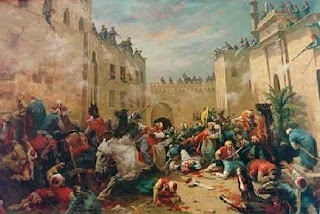Egypt's Watershed Moment
The successful military campaign against the Muslim
Brotherhood encampments in Cairo today was a watershed moment in Egyptian and
indeed Arab history akin to Muhammad Ali's 'elimination' of the Mameluk threat over
200 years ago. A new page has been turned and Muhammed Ali’s army has come out
on top as undisputed victor once again. What happens next is any one's guess,
but the line has been drawn in the sand and redrawn, negotiated and renegotiated
over and both sides have stubbornly refused to budge an inch or try to find an
acceptable middle ground. In the end, the side which had the military means and
the will to use force to bolster its authority did so.
Lebanon Lebanon
In the Middle East it has
always been an all-or-nothing game, either total victory or total defeat. This
same struggle will likely be played out time and again across the Arab world as
the struggle to find and hold on to that precious middle ground is lost in favor of a zero sum strategy.
But according to many observers Egypt
will not see much needed stability and security for some time to come, nor, I
suspect, will many Arab Capitals many of whom will sooner or later have to grapple with the
same issues that Egypt
Protection for minorities in the Middle
East is non existent. Today, following the bloody events on Egypt Middle East have long been
viewed with suspicion and derision by the reigning majority, more often than
not a Sunni Muslim majority.
The Lebanese and their small country may be a lot of bad
things, they may be quarrelsome and narcissistic, self absorbed and arrogant,
proud and foolish at times, but one thing still holds us together as a nation,
our uncompromising love and defense of personal freedoms, the hallmark of a
true democracy. The Lebanese people’s commitment and support of their national
army has strengthened their resolve to stand opposed to any violent
ideology that threatens the safety, security and integrity of the State. But Lebanon




Comments
Post a Comment